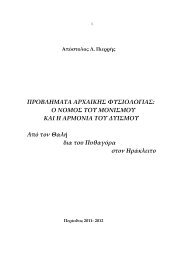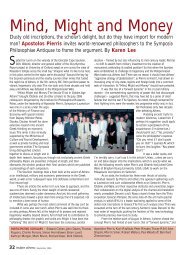chapter 10 the monism of darkness and the dualism of limit and ...
chapter 10 the monism of darkness and the dualism of limit and ...
chapter 10 the monism of darkness and the dualism of limit and ...
You also want an ePaper? Increase the reach of your titles
YUMPU automatically turns print PDFs into web optimized ePapers that Google loves.
MONISM OF DARKNESS - DUALISM OF LIMIT AND INDETERMINACY 75<br />
position <strong>of</strong> primary importance is given to <strong>the</strong> Orphics. Philodemus,<br />
De pietate 13. 16 sqq. p. 80 Gomerz = VI. 16 sqq. p. 17, A. Henrichs,<br />
Die Kritik der Stoischen Theologie im Pherc. 1428, Cronache<br />
Ercolanensi 4 (1974): âÓ ‰b Ùˇá ‰Â˘Ù¤Úˇˆ (sc. book <strong>of</strong> <strong>the</strong> treatise ÂÚd<br />
£ÂáÓ) Ù¿ Ù Âå˜ \OÚʤ· ηd MÔ˘Û·ÖÔÓ àÓ·ÊÂÚfiÌÂÓ· ηd Ùa apple·Ú’<br />
^OÌ‹Úˇˆ ηd ^HÛÈfi‰ˇˆ ηd EéÚÈapple›‰FË Î·d appleÔÈËÙ·Ö˜ ôÏÏÔȘ ó˜ ηd<br />
KÏ¿Óı˘ appleÂÈÚÄÙ·È Û˘ÓÔÈÎÂÈÔÜÓ (sc. Chrysippus) Ù·Ö˜ ‰fiͷȘ ·éÙáÓ<br />
(sc. <strong>of</strong> <strong>the</strong> Stoics). In <strong>the</strong> context <strong>of</strong> such assimilative associations <strong>and</strong><br />
with reference to Orphic doctrine it is attested that he considered<br />
Night to be <strong>the</strong> very first goddess; op. cit. 14. 18 sqq. p. 81 Gomperz<br />
= VII. 18 p. 18 Henrichs: ηd ‰c ÎàÓ Ùˇá appleÚÒÙˇˆ (sc. book <strong>of</strong> ÂÚd<br />
º‡Ûˆ˜) ÙcÓ N‡ÎÙ· ıÂ¿Ó ÊËÛÈÓ ÂrÓ·È appleÚˆÙ›ÛÙËÓ.<br />
The Middle Comedy poet Antiphanes (first half <strong>of</strong> <strong>the</strong> fourth c.<br />
B.C.) exhibits in one <strong>of</strong> his plays a <strong>the</strong>ogony 31 like Aristophanes’ in<br />
<strong>the</strong> Birds. According to Irenaeus, Contra Haereses II, 18,1 II pp. 366-<br />
7 Harvey, Antiphanes spoke more truly <strong>and</strong> acceptably about <strong>the</strong> first<br />
principles than <strong>the</strong> Gnostic Valentinians: ille enim de Nocte et Silentio<br />
Chaos emissum dicit, dehinc de Chao et Nocte Cupidinem, et ex hoc<br />
Lumen, dehinc reliquam secundum eum primam deorum genesim;<br />
post quos rursus secundam deorum generationem inducit et mundi<br />
fabricationem; dehinc de secundis diis narrat hominum<br />
plasmationem. From Silence <strong>and</strong> Night Chaos springs, from Chaos<br />
<strong>and</strong> Night Eros, from Eros Light <strong>and</strong> <strong>the</strong> first divine Generation<br />
emerge, <strong>the</strong>n <strong>the</strong> second divine Generation <strong>and</strong> World-Formation<br />
come out, <strong>and</strong> later Anthropogony occurs, man being fashioned by<br />
<strong>the</strong> second gods. Silence corresponds to <strong>the</strong> hypostasized Quiescence<br />
<strong>of</strong> Valentinian Gnosis <strong>and</strong> to ‘<strong>the</strong> god-nurtured (or, ra<strong>the</strong>r, <strong>the</strong> godnurturing)<br />
silence <strong>of</strong> <strong>the</strong> Fa<strong>the</strong>rs’ (ıÂÔıÚ¤ÌÌÔÓ· ÛÈÁc ÙáÓ ·Ù¤ÚˆÓ)<br />
<strong>of</strong> <strong>the</strong> Chaldaean Oracles (fr. 16 des Places. The Fa<strong>the</strong>rs’ silence st<strong>and</strong>s<br />
on <strong>the</strong> same level as paternal depth, apple·ÙÚÈÎe˜ ‚˘ıfi˜, fr. 18 des Places.<br />
Cf. e.g. Lewy, Chaldaean Oracles <strong>and</strong> Theurgy p. 160, <strong>and</strong> also<br />
Heracleitus, Homerica Problemata 65, 3). This presents a dualistic<br />
insertion into <strong>the</strong> Monism <strong>of</strong> Darkness <strong>of</strong> <strong>the</strong> underlying system:<br />
Night functions as Male vis-à-vis Silence <strong>and</strong> as Female with reference<br />
to Chaos. In all likelihood X¿Ô˜ is named after ¯‡ÛȘ (pouring forth),<br />
as in <strong>the</strong> Stoic interpretation <strong>of</strong> Hesiodic Chaos, to denote <strong>the</strong> flowing<br />
stream <strong>of</strong> <strong>the</strong> Water <strong>of</strong> Abyss; hence it fits in <strong>the</strong> ontological plane <strong>of</strong><br />
Ocean-Time-Ophioneus, not in <strong>the</strong> truly presupposed plane <strong>of</strong> <strong>the</strong>










